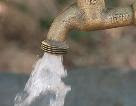
Tzvi Ben Gedalyahu
A7 News
The Water Authority rejects Amnesty International claims, to be released in a report on Tuesday, that Israelis whet their thirst at the expense of Palestinian Authority Arabs. The Water Authority countered that PA Arabs continually violate Oslo Accords by illegally drilling for water and spilling untreated sewage. “The Amnesty report is selective and incorrect, to make an understatement,” said spokesmen for Water Authority chairman Uri Shore.
Despite several claims by human rights organizations that Israel has taken water away from what is now the Palestinian Authority, the amount of water available to PA Arabs since the Six-Day War in 1967 actually has gone up while Israelis have suffered a whopping 70 percent drop in their resources.
“The amount of natural water, including underground aquifers, the amount of water available annually to every Israeli before 1967 was 500 cubic meters a year,” the Water Authority explained. “Today the figure is 149 cubic meters, while water available to PA Arabs actually has increased by 22 percent, from 87 cubic meters to 105 cubic meters a year per capita.”
It noted that the gap that exists “is not so great” to be termed a disaster.
At the same time, the PA is not treating sewage for agriculture, as agreed on with Israel in 1995 as part of the Oslo Accords. NGO Monitor’s President Prof. Gerald Steinberg said, “Amnesty’s report manipulates the issue of water and ignores the complexities of history and law in order to again falsely portray Israel as a brutal regime. The report adopts a painfully simplistic narrative which places blame solely on Israel, to the extent that the Palestinian leadership is absolved of responsibility for the agreements signed under the Oslo framework."
Israel’s water resources are near an all-time low, following four years of drought along with increasing water usage and a growing population. Higher water levies and conservation measures have cut water consumption by more than 20 percent this year.
Forecasters have cautiously predicted this winter will be wetter than usual, but it would take a modern miracle to replenish the country’s resources.
Scattered heavy rain fell in northern and eastern parts of the country on Monday as another heat wave hit the country. The amount of precipitation was impressive by falling a period of a few minutes but had little effect on Kinneret and underground aquifers.
No comments:
Post a Comment